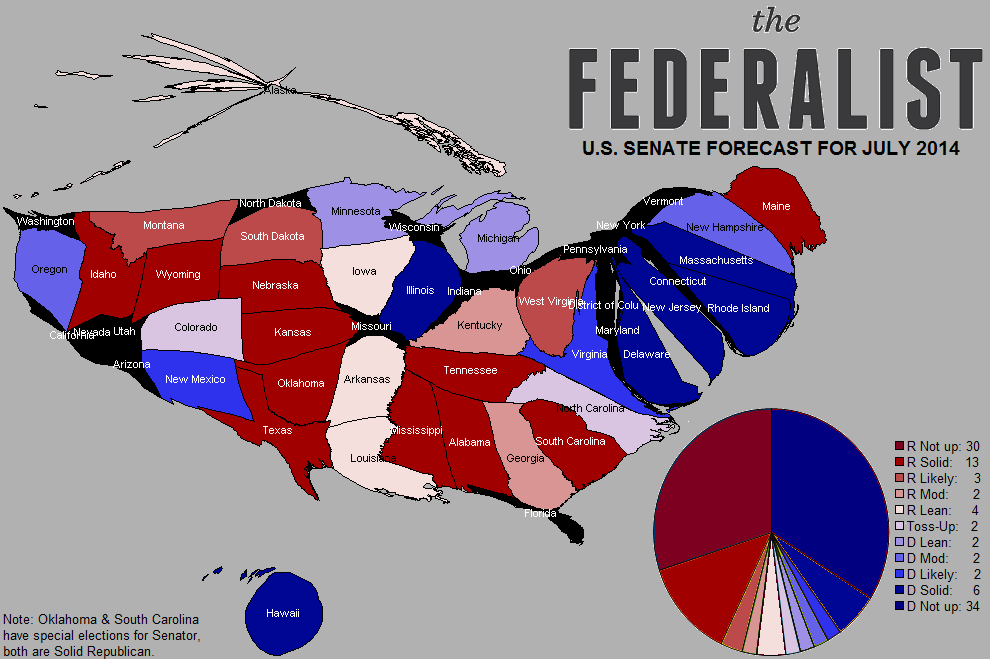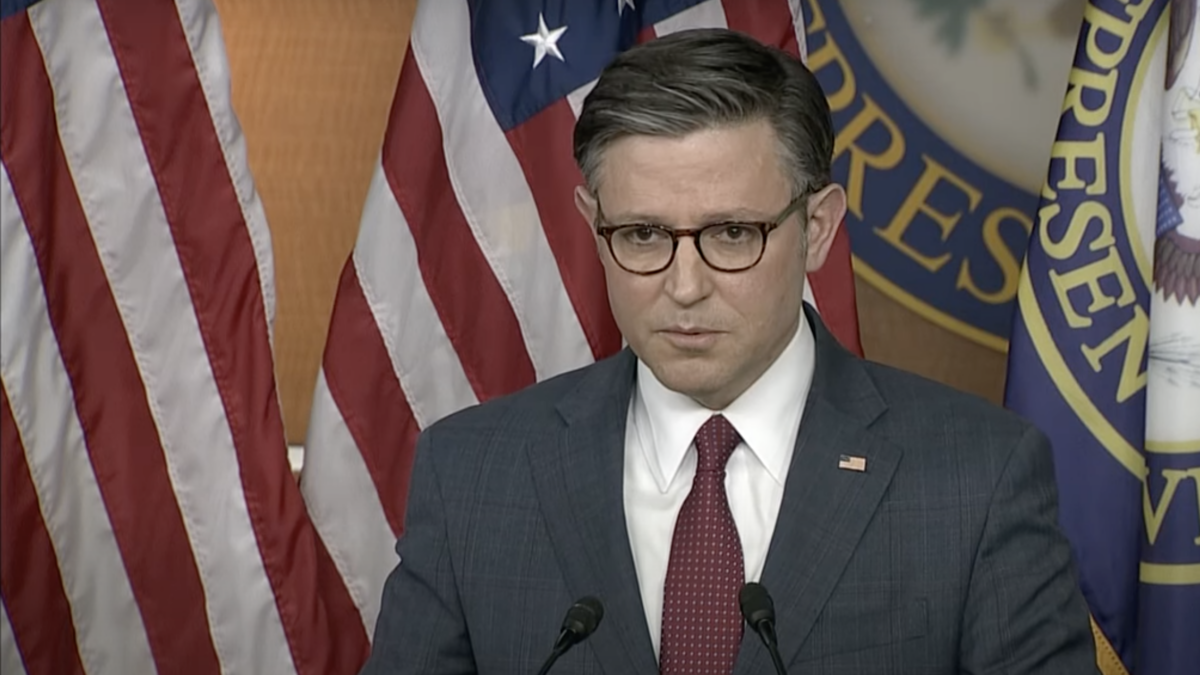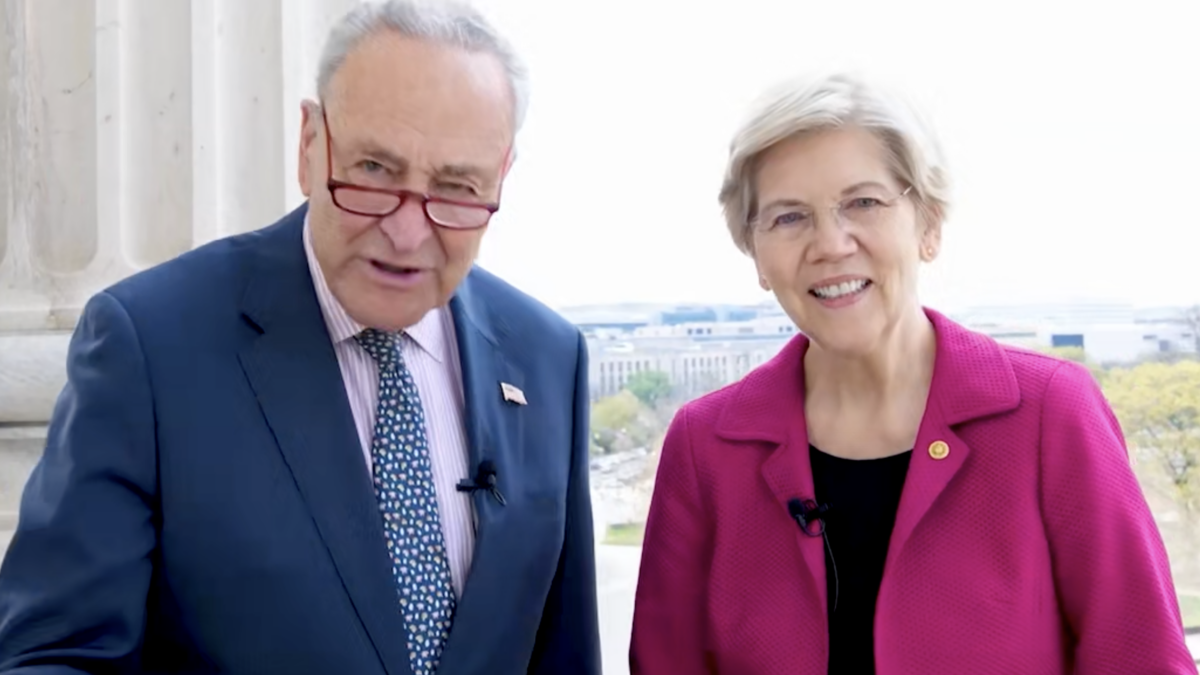
With most of the primary drama now out of the way, nearly every competitive seat we are tracking for the 2014 Senate elections has its lineup determined, Alaska being the glaring exception. Polling has begun to roll in at a regular pace, and the New York Times/CBS News/YouGov monster dropped on Sunday was hailed by election junkies everywhere as it provided a rare nonpartisan data point in all of the key races. Going from that data dump alone, Republicans are favored to gain eight seats in the Senate and hold their two vulnerable seats by at least four points. However, it isn’t the only data point, so our own forecast differs slightly.
We recently switched over to a cartogram. An overwhelming number of seats are held by Democrats, but as their fortunes this cycle have crashed, it certainly doesn’t look that way:

North Carolina
Thom Tillis has stumbled substantially against incumbent Sen. Kay Hagan, likely due to the drawn-out legislative session. The latest NYT/CBS/YouGov poll gives Tillis a narrow 48 percent-47 percent lead, and Public Policy Polling (with all candidates included) finds Hagan up 42 to 39 percent. With the polls turning against him, the state changes from moderately Republican to toss-up. Hagan is still quite vulnerable: a 42 percent share of the vote with less than 100 days to go is atrocious, but a damaged opponent gives her a way to hang on. If the session finishes soon, Tillis may be able to bring focus back on Hagan, in which case her odds drop yet again.
Iowa
Republicans have made great progress in an open race, Iowa, since the start of the year. We now favor Joni Ernst over the gaffe-happy Democrat Bruce Braley enough to change the race to “lean Republican.” Braley was favored initially to win this race, but as his gaffe on farmers grew legs, Ernst’s ads went viral, Republicans lined up to endorse her, and the lead in the polls shifted, Democrats have to be kicking themselves. This rating change is more significant for Republicans than the switch back in North Carolina is for Democrats, because Republicans have had a very low rate of success with knocking off incumbents, but have had moderate success with open seats. Now favored in three of the four open Democratic ones, they’re halfway to the six needed to make Sen. Harry Reid a minority leader.
Other Races Worth Watching
The biggest question mark is Alaska, where Republicans Dan Sullivan and Mead Treadwell are still duking it out for the right to challenge incumbent Sen. Mark Begich. We currently favor the Republicans to win this race narrowly, mostly due to Begich’s narrow win in 2008 and polling, but the state is notoriously difficult to poll, the most recent results (especially the YouGov survey) show big swings between potential matchups, and there is still the question of an Independent Joe Miller bid, although that is looking increasingly unlikely.
Republicans are looking good in Georgia, with the contentious primary out of the way and Rep. Jack Kingston’s rapid endorsement of David Perdue; and Mitch McConnell seems to be holding his own in Kentucky. If these races begin to trend towards their fundamentals, Democrats have nowhere else to go besides protecting their most vulnerable incumbents. Keeping these in play has been an essential part of their strategy up to now. That holds, the question of majority remains up in the air. If that gives, then it is a long way down.
Montana, South Dakota, and West Virginia haven’t been interesting lately, and while the news of Sen. John Walsh’s plagiarism raised eyebrows, it won’t affect his already atrocious performance in that race. Republicans have built a foundation for winning a majority that has held firmly for months with no sign of erosion. As mentioned before, Republicans do best in open seats, and are carrying this category well (Walsh is technically filling out the rest of Max Baucus’ term, so we count it as open).
The same cannot be said, however, of their pursuit to knock out incumbents. Bill Cassidy edges Mary Landrieu, Tom Cotton edges Mark Pryor, and we barely give the GOP the benefit of the basics in Alaska, but all of these are still stubbornly close. In addition, no progress has been made by either Scott Brown or Ed Gillespie in closing their races up, and Minnesota and Oregon are in stasis. Republicans would likely be doing better if one more incumbent chose retirement this cycle, but that wasn’t in the cards for 2014.
If we are to see a wave appear, a majority of these races should break, obviously, for the GOP. So far, that has failed to materialize. But election day is still three lifetimes away, so there is plenty of time for that to develop, or for the Republicans to blow yet another round.








